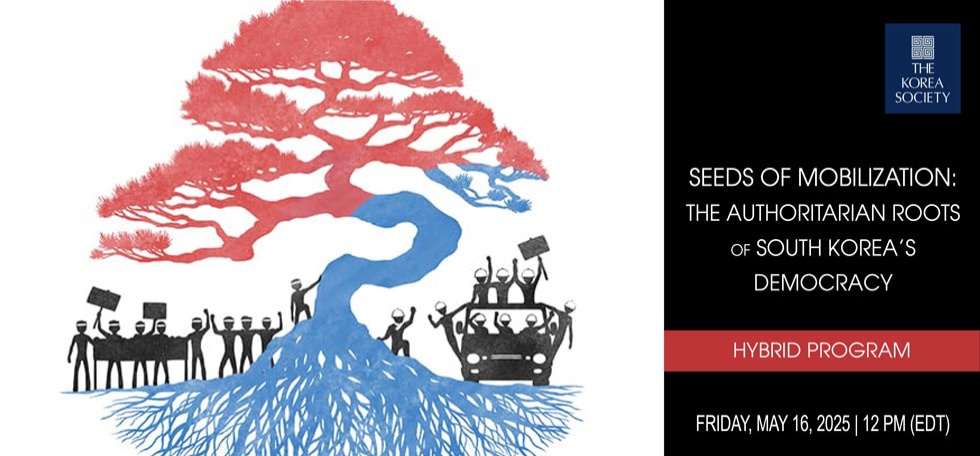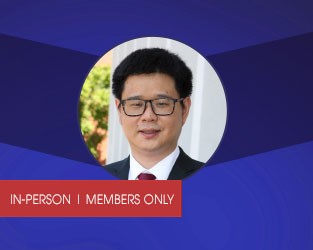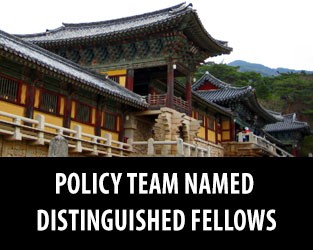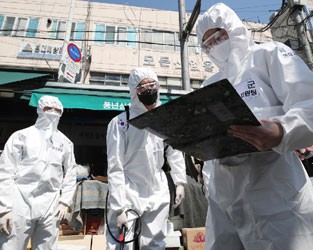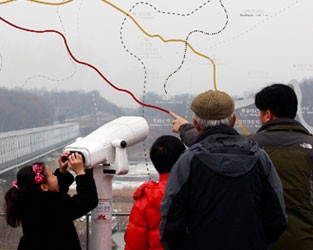Korea-U.S. Relations: From Allies to Global Partners
Thursday, April 18, 2013
His Excellency Choi Young-jin, Ambassador of the Republic of Korea to the United States
Ambassador Thomas Hubbard, Chairman of The Korea Society
Introduction by Ambassador Mark Minton, President of The Korea Society
AMBASSADOR MINTON:
It is my pleasure to introduce this evening's main speakers for a discussion about Korea's growing global role as well as its current relationship with the United States. We are honored to have with us the Ambassador of the Republic of Korea to the United States, His Excellency Choi Young-jin. We are especially honored to have Ambassador Choi with us tonight as President Park Geun-hye is visiting Washington in just a few weeks. All of us who have been in diplomatic service know that one has little extra time in the month before such an event. Ambassador Choi assured us he would attend this evening, and we are very grateful to have him here.
Ambassador YJ Choi has had a long and distinguished forty-year career as an international statesman and diplomatic representative of his country. His Excellency served in the Francophone countries of France, Senegal, and the Democratic Republic of the Congo and graduated from the Sorbonne (University of Paris) with masters and doctorate degrees in international political science. He held an important position as deputy executive director of the Korean Peninsula Energy Development Organization here in New York City, charged with implementing the Agreed Framework between the DPRK, the United States and the Republic of Korea along with the involvement of Japan. His Excellency served as South Korea's ambassador to Austria and Slovenia. He has served as an assistant secretary-general at the United Nations and as his country's ambassador to the United Nations. He served in Seoul as a vice foreign minister and currently, of course, holds the assignment of Ambassador to the United States.
His interlocutor tonight is Ambassador Thomas C. Hubbard, Chairman of The Korea Society. Ambassador Hubbard was my boss in Seoul when I was his deputy. He served as ambassador to the Philippines as well as to the Republic of Korea. He is currently with McLarty Associates of Washington, DC and holds the title of senior director for Asia with that consultancy. Of course, his major role is as chairman of The Korea Society. Ambassador Hubbard is one of the most knowledgeable career diplomats on Japan and has deep experience in the U.S.-Japan relationship. He served in other Asian countries, as well. Please help me in welcoming both Ambassador Choi and Ambassador Hubbard to the stage. [Applause]
AMBASSADOR HUBBARD:
Thank you very much, Mark, for your kind introduction. I'd like to thank all of you for joining Ambassador Choi and me tonight as we discuss important aspects of the US-Korea relationship. I also wish to thank our gracious hosts here in Denver. WorldDenver is a wonderful organization, and we appreciate the support of the Denver World Trade Center, as well.
I am particularly pleased to also have our sponsors from McKenna Long & Aldridge with us this evening. My relationship with McKenna Long has been with the Atlanta and Washington offices, and I have worked very closely with partners Song Jung and Andy Park as they’ve built their practice in Seoul. Song Jung is a valuable member of our board at The Korea Society. I'm sorry he couldn't be with us tonight but am very pleased to see Lino and all the rest of you here this evening.
I don't have any prepared remarks, but Congresswoman DeGette covered just about everything I planned to say (which usually happens to me) about the valuable relationship between the United States and the Republic of Korea. As part of our broader presence in Asia, we have a very significant presence on the Korean Peninsula and a lot in common with the South Koreans.
Just a few weeks ago, Mark and I had the great pleasure of attending the inauguration of President Park Geun-hye. I would have told anyone even five years ago that they were crazy if they believed South Korea would elect a female president before the United States did likewise. As it turns out, South Korea has a very able female president. Mark and I are very pleased to know her and to have had the chance to be at her inauguration. [Applause]
Going back twenty or thirty years, I don't think anyone would have forecast South Korea's extraordinary success as a vibrant democracy and major economic world player, or that it would successively elect different parties to the presidency along with having a female president. Going back twenty to thirty years ago, I don't think any of us could have imagined South Korea as one of the world's top twelve to fifteen economies with an even higher rating in per capita income.
We enjoy excellent relations with South Korea as an ally, as a security partner and additionally as a valuable free trade partner. After I retired from government service eight years ago, I became actively involved in ensuring the successful movement of the Free Trade Agreement through Congress (with much thanks to people like Congresswoman DeGette). We even solved the beef problem so important to Colorado. Your state is, once again, a major exporter of beef to the Republic of Korea. This beneficial relationship is well reflected in statements and speeches by President Obama and other senior US officials, including Secretary of State John Kerry during his visit to Korea at the end of last week. In partnership with the United States, global Korea is now a major economic and cultural player on the world stage with an increasing role solving global problems.
It is no accident that the Secretary General of the UN is Korean. A Korean-born Korean-American is the President of the World Bank. Korea is reaching out to lead the world community and to help solve the world's economic problems by encouraging broad-based inclusive growth around the world and dealing with the environmental problems stemming from global warming. South Korea has been and continues to be a wonderful and welcome partner.
Unfortunately, a lot of what we see on the news is about the other Korea—North Korea—a closed dictatorship with a regime neglecting the needs of its people and focused on the production of nuclear weapons and missiles. North Korea's leadership is spreading bombast through the news cycle in a manner we haven't heard for years. Russell Kemp told me that his eleven-year-old daughter recently turned on the television and was frightened to learn that Kim Jong Un was targeting Colorado Springs with nuclear weaponry. The good news is we're sure he can't hit Colorado Springs with anything close to a nuclear weapon. He probably can't hit Guam either. Over the medium to long-term, however, the North Korean weapons program is a problem which will have to be dealt with.
The tension emanating from the Korean Peninsula is a big problem today and in some ways detracts from the success we see elsewhere in Korea. Representative DeGette has already covered this very interesting topic and I am pleased to have Ambassador Choi here to talk about this, as well. And so without further adieu, I'd like to ask Ambassador Choi to share his opening remarks.
AMBASSADOR CHOI:
Thank you, Ambassador Hubbard and Ambassador Minton, for inviting me here this evening. Ever since I attended some ball games played by the Colorado Rockies, the Denver Broncos and the Denver Nuggets, I have dreamed that one day I would be able to come to Denver, and here I am. [Applause] When I saw this evening's menu of Korean dishes, such as naengmyeon noodles, kimchi and bulgogi, I felt really at home. Denver is a city whose culture of hospitality is just like that of Korea's, and I thank you for that.
Let me start by talking about the special relationship between the United States and Korea. Sixty years ago, the Korean War ended, yet the alliance between our countries continues. This year we celebrate the 60th anniversary of the armistice. Let us go back sixty years and talk about what Korea was like at that time. Sixty years ago, Korea was much like every other underdeveloped country in the world—one of extreme poverty with very little hope for the future. During the last sixty years, Korea has come of age on every account with the adoption of democracy, through the development of economic growth and by sharing Korean culture around the globe.
Korea's democracy produced the first female leader ever in the East Asian Confucian part of the world, and her arrival in Washington in three weeks is testimony that Korea's democratic form of government has come of age in only two generations. Three years ago, Korea surpassed the $1 trillion mark in terms of its trade volume and national GDP. Only seven other countries have accomplished this, and today Korea is ranked within the top ten to twelve economies in the world. Of course culturally we have "Gangnam Style" YouTube videos. Even before that there were Korean dramas, Korean songs and Korean movies spreading rapidly beyond Asia. All of this has been possible because of America's friendship and alliance with South Korea.
I ran a nine-nation peacekeeping operation in Africa for three years. A president of [one] African country asked me for the secret that led to the success of South Korea. When that African country became independent six years ago, their per capita income and prospects were much better than Korea's. Now most African countries import cell phones, cars, air conditioners, TV sets and almost all of our industrial products rather than exporting these products to Korea. This has become possible because of the extraordinary relationship between the United States and Korea. People in Korea never forget, and they believe that the success story derived from the U.S.-Korea relationship has been America's most successful engagement in history. None of Korea's rivals have benefitted as Korea has through its engagement abroad.
Korea learned from America and established a relief program like the Peace Corps. No other country in the world does that. For the Peace Corps members, we have a program which invites them to observe the difference they have made in Korea so they can be proud of what they have done. In reference to the FTA, Korea has the most Free Trade Agreements. The US-Korea FTA serves as a model for other FTA agreements being negotiated in the world today, including the TPP (Trans-Pacific Partnership), the Korea-China free trade agreement negotiations, and Korea-China-Japan free trade negotiations.
Korea has a very special relationship with the United States. This year we'll be celebrating the sixtieth anniversary of the Korean War armistice in July. We will have ceremonies concurrently in Washington and Seoul, and will then have the opportunity to take stock of where we are now and to also envision how we can make this special relationship relevant well into the twenty-first century. [Applause]
THOMAS HUBBARD:
Thank you very much, Ambassador. I talked a bit about Korea's increasing role with international institutions. Could you perhaps elaborate on your new government's view towards Korea's ongoing role around the globe?
CHOI YOUNG-JIN:
Korea is a very old country. During dinner, we discussed that the establishment of Seoul, the capital of South Korea, dates back over 2000 years. As Korea was confined to the small geographic region of the Peninsula, it remained a parochial country for most of its history—until America came to open our doors. As our economy develops, Korea is becoming increasingly regional while contributing to peace and stability in the region, including Northeast Asia. Recently, the slogan global Korea has become the watchword for the citizenry as well as for the Korean government.
Korea is the very first country, on record, to transform itself from a recipient country to a donor country, and this is one of Korea's strengths as it develops into a global country. Korea is very keen on developing itself internationally because otherwise it cannot thrive or perhaps even survive. We depend heavily on our trade with other countries. We have virtually no natural resources. We only have the human resource of brain power. Should we not go global, our future is not very promising at all.
It is for this reason that we have become a donor country. We are expanding our relationship with Africa as well as North America. We have hosted many international conferences including the APEC Summit, the Nuclear Security Summit and the G20 Summit meeting in order to link Korea with the outside world. The importance of trade and investment to our international growth means we must be very visible on the world stage, as without a healthy state of competitiveness, Korea will only stagnate. We are determined to go global, and America is our best partner for moving forward.
Diplomatically, we are on the same page with America when it comes to the difficult issues posed by places like Afghanistan, Iran, Iraq, Syria, Libya, and even Somalia. This proves that Korea is determined to go global by developing its economic strength along with the indispensable partnership of the United States.
THOMAS HUBBARD:
Thank you, Ambassador Choi. I'd like to make note that among Korea's other distinctions, they have the first company, Samsung, capable of challenging Apple. That is surely a symbol of Korea's industrial creativity and of your growing success in the world. After such a positive discussion, I hesitate to bring up the subject of North Korea. You did mention that South Korea and the United States have been successfully collaborating, dealing with issues such as Somalia, Iran and Afghanistan. How can the United States and South Korea collaborate to resolve the issue closest to the hearts of all South Koreans—that of North Korea? How would you suggest we improve the situation on the Korean Peninsula?
CHOI YOUNG-JIN:
To explain the issue of North Korea, I like to introduce the concept of American exceptionalism. Early in the last century, when East Asia was opening up, European powers came to our region and brought the paradigm of colonialism and military raids. America, unlike the old colonial powers, came to our region with the paradigm of trade and an open-door policy. That made all the difference.
As you know, Japan's economic growth came first. The Four Dragons of East Asia (South Korea, Taiwan, Hong Kong and Singapore) followed suit. Now China is with us, and other East Asian and South Asian countries are registering phenomenal economic growth. The basis for this was, in part, made possible because of American exceptionalism; that is, America is a different country from Eastern European countries whose philosophies are based on colonialism, expansionism, war and military might. We must acknowledge that, that trade paradigm is the key to understanding what's happening in the East Asia and Pacific region.
North Korea is the only country in the entire East Asian region which has yet to accept the trade paradigm. The best reference to understanding North Korea is the Soviet Union, clinging onto the old paradigm of military raids and colonialism, along with the building of heavy weapons and weapons of mass destruction while making the military the focus of their citizenry. This is the Soviet style. The North Korean problem can only be resolved once the country comes in from the cold to join the paradigm of trade with other countries in the region, increase interdependence with us and engage in trade and investment.
What's happening in North Korea today is the same pattern we have seen for the last twenty years. They test their nuclear weapons or they declare that they have a nuclear weapons program. They test fire some missiles, heighten tension, and then right at the climax they de-escalate and ask us to negotiate. We have cooperated three times in the past. I believe this current phase of escalation is either reaching its peak or near there, because we are still waiting to see whether North Korea will test fire their medium-range Musudan missiles. I predict that de-escalation will come very soon, and North Korea will again ask to negotiate with us.
I think North Korea is mistaken this time, because unlike the past twenty years, neither Washington nor Korea will reward their unacceptable behavior. If they use the same pattern as they have done over the last twenty years, this time it cannot possibly work. So, the future is not very bright, because a negotiation will not easily take place. Even if it does takes place, it must be preceded by North Korea demonstrating that things are different this time in approaching normalization.
The one silver lining is China, because China is accepting the trade paradigm. They are increasingly on the same page with America, Korea and Japan. That means North Korea is becoming more of a problem and a liability for China, and Beijing will increasingly see that the future lies with us. Last year, China's combined trade with the US, Japan and Korea exceeded $1 trillion. We are talking to China with an increased understanding that we must work together on the problem of North Korea in order to make that country come in from the cold and abandon the Soviet-style nuclear paradigm, adopt the Chinese style or even the South Korean style of a trade paradigm, and get rid of their weapons of mass destruction.
Barring any unacceptable conflict taking place, I am not too worried about the current rhetoric or hyperbolic words coming from North Korea, because it will de-escalate. I expect negotiations will come and go; but in the end, the nuclear weapons problem is linked to the North Korean problem itself. We have to tackle these issues together. The solution is to make North Korea come in from the cold.
[End]
" target="_blank">iTunes
![]() His Excellency YJ Choi, South Korea’s Ambassador to the United States, and Ambassador Thomas Hubbard, The Korea Society Chair, dialogued on the remarkable relationship between Korea and the United States, and Korea’s rise globally. Korea and the U.S. share a common security and vibrant business relations. Korea figures as a growing investor in the United States and a vibrant actor on economic, political and cultural stages. The Korea-U.S. (KORUS) Free Trade Agreement implementation has seen new opportunities and partnerships. With an introduction by Ambassador Mark Minton, Ambassadors Choi and Hubbard addressed both challenges and gains on the Peninsula.
His Excellency YJ Choi, South Korea’s Ambassador to the United States, and Ambassador Thomas Hubbard, The Korea Society Chair, dialogued on the remarkable relationship between Korea and the United States, and Korea’s rise globally. Korea and the U.S. share a common security and vibrant business relations. Korea figures as a growing investor in the United States and a vibrant actor on economic, political and cultural stages. The Korea-U.S. (KORUS) Free Trade Agreement implementation has seen new opportunities and partnerships. With an introduction by Ambassador Mark Minton, Ambassadors Choi and Hubbard addressed both challenges and gains on the Peninsula.
